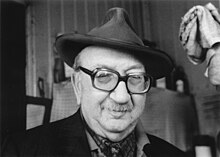| Matéo Maximoff | |
|---|---|
 | |
| Born | (1917-01-17)17 January 1917 |
| Died | 24 November 1999(1999-11-24) (aged 82) |
| This article needs additional citations for verification. Please help improve this article by adding citations to reliable sources. Unsourced material may be challenged and removed. Find sources: "Matéo Maximoff" – news · newspapers · books · scholar · JSTOR (February 2024) (Learn how and when to remove this message) |
Matéo Maximoff (French pronunciation: [mateo maksimɔf]; 17 January 1917 – 24 November 1999) was a French writer and Evangelical pastor of Romani ethnicity. His eleven books have been translated into fourteen languages. Born in Spain, he had parents who had migrated from Russia and France. His family sought shelter in France with relatives during the Spanish Civil War. After the outbreak of World War II, they were arrested as foreign nationals and interned for years, along with many other foreign refugees. He settled in France after the war and made his literary career there.
Early life and education
Maximoff was born in Barcelona, Spain. His father was a Kalderash Rom from Russia; and his mother was a Manouche from France. She was a cousin of the guitarist Django Reinhardt and his younger siblings.
Maximoff's father, a tinker, a traditional trade among Kalderash, taught him how to read, write and count. He also had much to tell him about Russia, Kalderash history, and different Roma and countries. He died when Maximoff was 14. Maximoff took over as a tinker to support himself, his mother and younger brothers and sisters. He taught his siblings to read and write.
Refuge in France
In 1936, because of the Spanish Civil War, Maximoff with his mother and siblings left Spain to seek shelter among relatives in France. In 1940, after the defeat of France in World War II and German occupation, the Maximoffs were arrested under suspicion of intelligence with the enemy, as were many other foreign refugees. Maximoff's family were interned in a camp for 'spies' for 42 days before being transferred to a 'Gypsy camp' in Tarbes. In May 1941, they were interned at a camp for 'nomads' nearby Lannemezan. At that time, the Roma were not allowed to travel and had their id's (travel license) withheld by local law enforcement agencies...
Literary career
After World War II, Maximoff settled in France. He wrote eleven novels, which have been translated into fourteen languages. He also produced a book that included ethnographic photographs of the Roma in France.
In 1964, Maximoff became an Evangelical pastor. He translated the Bible into Kalderash Romani language from French in 1994, although only the New Testament, Ruth and Psalms were published. Many of his other books were published into English in the late twentieth century, before his death in 1999 in France.
Bibliography
- Angels of Destiny (1999)
- People of Roads (1995)
- Roads without Caravans (1993)
- This world that isn't mine (1992)
- Say that with tears (1990)
- Vinguerka (1987)
- The Doll of Mameliga (1986)
- Condemned for Surviving (1984)
- The Seventh Daughter (1979)
- Savina (1957)
- The Price of Freedom (1955)
- The Ursitory (1946)
References
- ^ Hancock, Ian F. (2002). We are the Romani People. Univ of Hertfordshire Press. p. 133. ISBN 978-1-902806-19-8.
External links
- Mateo Maximoff's biography, Rombase
- Mateo Maximoff's bio, Romany Kultury i Dzhiipen (in Russian)
- Mateo Maximoff's bio, Unionsverlag (in German)
- Mateo Maximoff Archived 2018-01-18 at the Wayback Machine, O Vurdon (in Italian and English)
- 1917 births
- 1999 deaths
- 20th-century French non-fiction writers
- French evangelicals
- French people of Russian descent
- French Romani people
- Kalderash people
- Manouche people
- People of Russian-Romani descent
- Romani Christians
- Romani writers
- Writers from Barcelona
- Spanish emigrants to France
- 20th-century French male writers